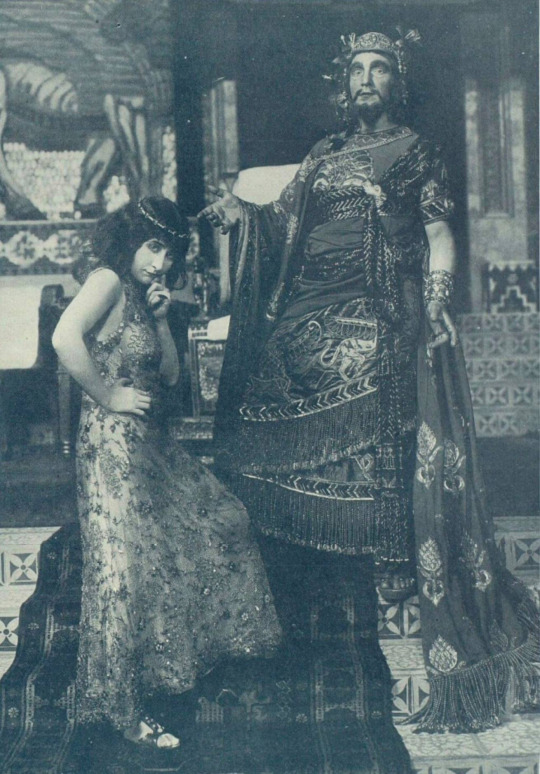#Charles Dalmorès
Text

Scottish soprano Mary Garden (1874-1964) and French tenor Charles Dalmorès (1871-1939) as Salome and Herod in Richard Strauss' one-act play at the Manhattan Opera House, March 14, 1910.
#classical music#opera#music history#bel canto#composer#classical composer#aria#classical studies#maestro#chest voice#Mary Garden#lyric soprano#soprano#mezzo-soprano#Charles Dalmorès#dramatic tenor#tenor#Richard Strauss#Salome#classical musician#classical muscias#classical history#history of music#opera history#musician#musicias#diva#prima donna
10 notes
·
View notes
Photo

Selma Kurz (October 15, 1874 – May 10, 1933) was an Austrian operatic soprano known for her brilliant coloratura technique. She was first heard in Vienna at a student concert of Ress pupils on March 22, 1895. She got good notices and offers poured from many opera houses, especially the ones in provincial Germany, which were always looking for new talent. She made her début in the title role of Ambroise Thomas's opera Mignon at the Hamburg Stadttheater, on May 12, 1895. She appeared there and at Frankfurt am Main for the next four seasons, singing diverse roles including Eudoxie in Halévy's La Juive, Elisabeth in Wagner's Tannhäuser and Bizet's Carmen. In the year-long Mozart festival performances organized to celebrate the composer's 150th birthday, Kurz sang Fiordiligi in Così fan tutte in 1905 and Konstanze in Die Entführung aus dem Serail a year later. Also in 1906, on the occasion of a much-acclaimed Caruso gala, she sang Gilda in Rigoletto, with Titta Ruffo in the title role. This was Ruffo's only appearance in Vienna. Although she had great triumphs in coloratura roles, Kurz did not neglect her lyric repertory. Indeed, of the 992 performances she would give at the Vienna Hofoper (later Staatsoper), more than 100 would be devoted to Mimì in Puccini's La bohème. She also created that composer's Madama Butterfly for Vienna (1907) as well as Saffi in Johann Strauss's Der Zigeunerbaron (1910). She sang Tatiana (Eugene Onegin) and Sophie (Der Rosenkavalier) in 1911 and, in one of the many high points of her Viennese career, created Zerbinetta in the world première of the second version of Richard Strauss's Ariadne auf Naxos, on October 4, 1916. She sang Zerbinetta 36 times in Vienna. In Vienna she sang every imaginable role, from Tchaikovsky's Iolanta and Wagner's Elsa (in Lohengrin) and Sieglinde (in Die Walküre) to Marguerite in Gounod's Faust, Massenet's Manon, Frau Fluth in Nicolai's The Merry Wives of Windsor and Rosalinde in Johann Strauss II's Die Fledermaus. Next to Mimì in La bohème, her most frequently heard roles were Gilda, Violetta and the Trovatore Leonora. Her last performance at the great theatre in the Ringstraße, where so many of her triumphs had been acclaimed by two generations of opera lovers from all over Europe and the world, took place on February 12, 1927. This appearance, as Rosina in The Barber of Seville, closed one of the most glorious operatic careers in the twentieth century. Form the outset Selma Kurz was widely required all over Europe and she appeared successfully in both opera and concert at the Grand Opéra in Paris, the Princely Opéra in Monte Carlo, Rome, Salzburg, Warsaw, Prague, Budapest, Amsterdam, Ostend, Bucharest and Cairo. In London she was first heard in May 1904 in Rigoletto, with Enrico Caruso and Maurice Renaud. She then sang her famous page, Oscar, in Un ballo in maschera, with Giannina Russ, Caruso, Antonio Scotti and Marcel Journet. The following year she again sang A Masked Ball with Caruso and Mario Sammarco as well as her other favourite page role, Urbain in Les Huguenots, opposite Emmy Destinn, Caruso, Scotti, Journet and Clarence Whitehill. She also appeared in Gounod's Roméo et Juliette opposite Charles Dalmorès' Romeo. She also repeated, in these two seasons of coloratura successes, her Elisabeth in Tannhäuser, with Karel Burian in the title role. In 1907 she was heard again at Covent Garden, this time in Lucia di Lammermoor, with Alessandro Bonci as Edgardo. She repeated Rigoletto (with Bonci and Sammarco) and Un ballo in maschera (with Amedeo Bassi) and added Catalani's Loreley, obviously a Bassi vehicle. She was then not heard at the Royal Opera until 1924, when she sang La bohème and La traviata. Her London appearances were extremely successful, notwithstanding the enmity of the all-powerful Nellie Melba, as entrenched at Covent Garden as Kurz was in Vienna.
4 notes
·
View notes